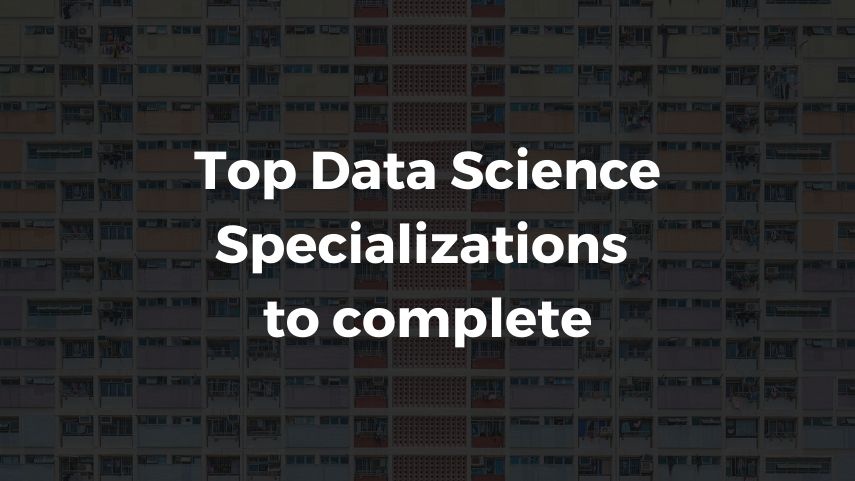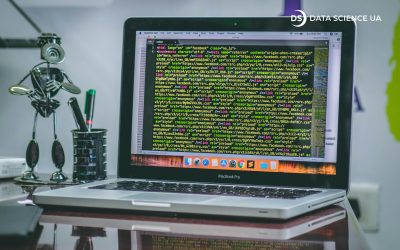Data science specializations
Data Science has already established itself as a field that drives innovation, so it is no wonder that the request for quality data science education has only been rising recently. And people seeking it often already have enough experience in other computer science fields and are simply looking for a new perspective in their work or career.
This article will overview the three most popular or prominent data science specializations and their biggest focuses and distinctions. Most of the state-of-the-art data science specializations today are paid ones. However, there are possibilities to obtain a free data science certification on other resources or receive financial aid for the paid course.
IBM
IBM Data Science Certificate is one of the most well-known and respected online specializations in Data Science. Available on Coursera and edX platforms, it is open for anyone who wants to obtain a data science career foundation.
The specialization incorporates most of the basic skills necessary to be accustomed to data science technologies. The price varies by platform where you are passing the specialization. As of late 2021, it is $873 on the edX platform for the entire course and $39 a month on Coursera.
The course requisites will suit even a person who wants to change their career radically. No programming skills or knowledge is required. However, from the math perspective, a basic understanding of calculus and statistics will be helpful.
Format of the certification envisages approximately one year and a month of study with 3-5 hours a week. Over the course of a week you will complete a single study module. Full-time learners can supposedly complete the certification in 2 or 3 months. The course consists of video lessons, readings, practice exercises, quizzes, and several projects, including the capstone project meant to culminate the class.
To complete the certification you need to complete nine different courses. First, the listeners find out what data science is, get to know the tools including IBM products, and the principles of data science methodology. Then move on to Python foundations, Databases, and SQL technologies for operating them, Data Analysis with Python with emphasis on data preparation, Data Visualization with Python, and Machine Learning with Python. The final course is dedicated to the capstone project. Listeners will use real-world data and go through all the main steps of a typical data science project.
The IBM Data Science Certificate can help you launch a career in data science or machine learning. According to one of the surveys of the course graduates, 71% of them enrolled to encourage career progression. 33% of the surveyed stated that it helped them increase their salaries, and for 25% it helped find a job. Upon completion, 27% of them worked as data analysts and another 20% as data scientists.
With so few formal DS certificates that encompass the entire field, the IBM certificate can be one of the ways to confirm your data science skills without a formal education. So if you seek such a confirmation of your skills while aiming to solidify your foundational knowledge, this choice may be for you. This certificate also offers general field knowledge, so it is beneficial even if you are not aiming to use IBM tools in your work.
The advantages of the IBM Data Science certification compared to other similar offerings are firstly in its target audience and format. As mentioned earlier, a potential listener may have any educational or professional background. It is structured to allow anyone to start learning data science after covering all the required basics.
Also, the course has significant coding inclusions and hands-on tasks, which can be beneficial for analytics professionals aiming to learn more technical details. Another advantage is the excellent structure of the material and learning process. Several projects and other practice tasks of high quality are included. They allow putting the received knowledge to use and testing it on the presented real-world application.
One of the main disadvantages of the certification is that it may be too general for learners with some initial data science experience, as the course gives a detailed introduction to an extensive range of topics. Therefore, there is no focus on specific areas of Data Science or Machine Learning.
Harvard/edX
HarvardX Data Science Professional Certificate is possibly the most respected data science online certification developed with the direct participation of an educational institution of such a level. It was created by the professors of Harvard University and is currently available on the edX platform.
This specialization is based on the R programming language and introduces such needed topics for any data scientist as Statistics, Data Visualization, and Machine Learning. As of late 2021, the course price on edX is $793 for the entire certification.
There are no prerequisites to the course. However, as with the IBM course, any prior math and programming experience will benefit from studying with the specialization.
Format of the HarvardX Data Science certification states one year and five months as the desired studying period, with an estimation of 2-3 hours per week. HarvardX specialization is self-paced and can be compressed to only 3 or 4 months if needed. This specialization contains numerous video lectures, practice tasks, quizzes, and a final capstone project.
The certification consists of nine different courses. However, they focus on slightly different parts of data science compared with what IBM does.
The first course is dedicated to the basics of the R language, reviewing the assigned task with real data. The Data Visualization course uses R’s abilities and packages. Subsequent courses cover Probability with its concepts and fundamental principles, statistical inference, modeling, confidence intervals. They also teach productivity Unix or Linux tools for data science to optimally manage the data and the program. The course will make the listeners familiar with GitHub and R studio.
Other topics in the specialization are data wrangling, mining, processing, and cleaning; Linear regression and the relationship between variables; and, finally, machine learning principles. The dedication of the last course is to the final capstone project with real-world data.
The HarvardX Data Science Professional Certificate can be helpful for people who are looking to start a career in data science or machine learning but have yet to choose their language or technology specialization and want to go through the basic principles. As it covers the basics in detail, people who have limited experience with probability theory can find it more valuable than the IBM course, for example.
And of course, it is beneficial for those who are looking to improve their visualization skills, as R’s package ggplot2 is widely known as an excellent tool for visualization. Overall, it allows listeners to enter the world of data science without Python knowledge, especially if they are interested in R. So if you don’t want to limit yourself to Python, or you are unsure what technologies you will use in the future, this may be the choice to consider.
The main advantage of the HarvardX Data Science Certification is obtaining and testing data science skills with examples and mentors present. The number of overviewed concepts widely used in data science but still belong to beginning skills is impressive. Therefore, the listeners can learn such technologies that some other courses deem either obvious or foundational. Often, the starting students have no idea how to deal with them.
One of the primary and significant disadvantages of this specialization is that it is focused solely on R. The people who want to use Python or other technologies will have to learn their basics by themselves. Also, several topics, such as productivity tools, go slightly outside of the classical field of data science. As a result, some more experienced DS learners may find the course too slow-paced and general.
MIT
MIT MicroMasters in Statistics and Data Science is an online certification offered by the Massachusetts Institute of Technology in collaboration with edX and is a bit different from the previous certification presented in this article. It is not only an online certificate by name. It includes a completion certificate issued by MIT. While it is not a university degree or related to it, it can help start a road for the actual academic path in data science.
The MicroMasters programs by themselves are the selections of graduate-level courses offered for completion. The main aim of such programs is to boost the professional career of the person who finished it. Courses embedded into this program build a bridge between statistics and data science with machine learning, using five of them to highlight the principles of working with data.
The price of the certification, as of late 2021, is $1,350. And even if it is higher than some of the other offered certifications, don’t forget that this is a certificate of a higher level. Graduates can use credits earned during their studies in other universities worldwide to complete a formal Master’s degree in data science, statistics, or a similar field. You can find an extensive list of such opportunities on the page of the certification.
The prerequisites of the course are college-level knowledge of calculus, comfort with mathematical reasoning, and basics of Python programming. However, these requisites are more recommended than enforced in any kind. There is no admission process for the data science certification.
Format of the MicroMasters suggests approximately one year and two months of study, with 10-12 hours per week. This figure is noticeably higher than we’ve seen for other online courses or certifications. Moreover, the program authors point out that the courses here have the same pace as their equivalents for the on-campus Master’s program. Therefore, the certification is not self-paced and has determined assignment and exam times.
The content in the MicroMaster’s program consists of five courses. Four of them are the same for all participants, and the fifth one is an elective.
The mandatory courses start with a Probability course, which covers the basic principles of probability theory and modeling. Then Fundamentals of Statistics follows, from hypothesis testing to linear regression models and principal component analysis.
The next course turns to machine learning development services and Deep Learning in Python. Then, listeners can choose between two options: Data Analysis in Social Science or Data Analysis in Statistical Modelling and Computation. The program ends with a Capstone Exam.
The MIT MicroMasters in Statistics and Data Science can be helpful for those people who want to acquire advanced knowledge in data science and learn it from university-level tutors and sources. With the program being close to the real Masters’ program at MIT, this MicroMasters can be the best option to experience it.
Also, it can be ideal for listeners who aim for academic careers. As mentioned earlier, some institutions around the world can recognize the credits earned in the certification. So if you are looking for certification with potential academic credibility, this may be your choice.
Apart from the listed advantages above, the MicroMasters certification will be prestigious enough to significantly raise chances to get a job in data analytics or data science, as the exam results correspond to the original MIT exams and award academic credits.
The main disadvantage of the MicroMasters is its closeness to the traditional university setup, as it is not self-paced and has set times of course start and assignments. This requires more effective time management and commitment than the usual MOOCs.
Conclusions
With the variety of data science certification programs available today, it is possible to select the program that suits your personal needs. Therefore, it is crucial to select the type of program that would be the best content-wise and correspond to your time requirements.
In this article, we reviewed some of the most prominent data science certification programs. All of them are useful for career growth and educational perspectives.
|
IBM
|
Format | 1 year and 1 month of study with 3-5 hours a week. Full-time learners can complete in 2 or 3 months |
| Target audience | No programming skills or knowledge is required. Basic understanding of calculus and statistics will be helpful. Can help to start a career | |
| Price | 2021: $910 (entire specialization, edX), $39 (monthly, Coursera) | |
| Content | 9 courses: 1) What is Data Science? 2) Tools for Data Science 3) Data Science Methodology 4) Python for Data Science, AI & Development 5) Python Project for Data Science 6) Databases and SQL for Data Science with Python 7) Data Analysis with Python 8) Data Visualization with Python 9) Machine Learning with Python |
|
| Advantage | The target audience is listeners with any background. Great structure of the material and learning process | |
| Disadvantage | May be too general for the learners with experience in Data Science | |
|
Harvard/edX
|
Format | 1 year and 5 months with 2-3 hours study per week. Can be compressed to 3-4 months |
| Target audience | Not explicit, both starting learners and who seek a broader picture with R | |
| Price | $793 (entire specialization, edX) | |
| Content | 9 courses: 1) R basics 2) Visualization 3) Probability 4) Inference and Modeling 5) Productivity Tools 6) Wrangling 7) Linear Regression 8) Mashine Learning 9) Capstone |
|
| Advantage | Testing Data Science skills with examples and mentors, many foundational priciples reviewed | |
| Disadvantage | Is focused on R language, some topics are not part of classic Data Science | |
|
MIT
|
Format | 1 year and 2 months of study, with 10-12 hours per week |
| Target audience | Listeners with college-level calculus, comfort with mathematical reasoning, and Python, seeking to boost the career or academic perspectives | |
| Price | $1,350 (entire specialization, edX) | |
| Content | 5 courses: 1) Probability – The Science of Uncertainty and Data 2) Fundamentals of Statistics 3) Machine Learning with Python: from Linear Models to Deep Learning 4) Listeners choose from: 4.1) Data Analysis in Social Science – Assessing Your Knowledge 4.2) Data Analysis: Statistical Modelling and Computation in Applications 5) Capstone Exam in Statistics and Data Science |
|
| Advantage | Can significantly raise chances to get a job in Data Analytics or Data Science, credits are recognised by some universities | |
| Disadvantage | Bigger commitment challenge: not self-paced, set times of start, assignments, and exam |




